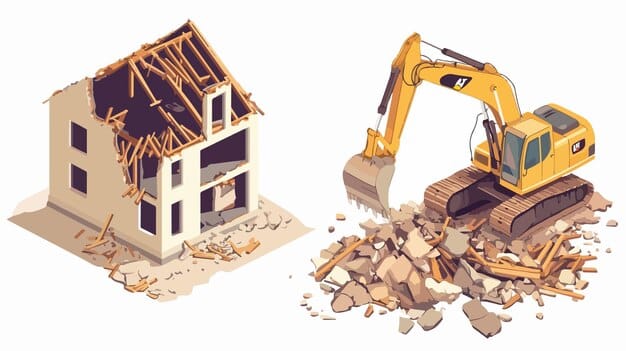Preparing for a demolition project in Montreal can be an exciting yet complex undertaking. Whether you’re renovating your property, clearing land for new construction, or removing an old structure, having a clear understanding of the process is essential for success. This guide provides an overview of what to expect during your Montreal demolition project and offers tips for smooth execution.
Defining the Scope of Demolition
- Types of Demolition Projects
Demolition projects differ based on the purpose and nature of the structure involved. Here are some common categories:
- Residential Demolition: Focuses on dismantling houses, duplexes, or smaller structures like garages.
- Commercial Demolition: Involves larger properties such as offices, warehouses, or retail establishments.
- Interior Demolition: Targets specific parts of a building, such as walls or floors, while preserving the rest.
- Selective Demolition: Removes certain sections or components to support partial renovations.
- Setting Clear Goals
Defining your project objectives is critical. Do you need a complete teardown, or are you retaining specific sections? Having a clear plan helps align expectations and ensures that your contractor delivers accordingly.
See Also Recycling and Disposal: Green Demolition in Montreal
Planning and Necessary Permits
- Choosing the Right Professionals
Hiring experienced demolition specialists is vital for safety and efficiency. Seek out licensed and insured contractors in Montreal with proven expertise. Reviews and referrals can provide insights into their reliability.
- Securing Permits
Most demolition projects in Montreal require permits from municipal authorities. The application process usually includes:
- Providing detailed project plans.
- Demonstrating compliance with zoning laws.
- Addressing environmental safety concerns.
Operating without the proper permits can lead to fines and delays, so ensure this step is prioritized.
Preparing the Site
- Site Evaluation
A comprehensive site assessment identifies potential hazards and informs the demolition strategy. Key aspects include:
- Checking for hazardous materials like asbestos or lead.
- Evaluating structural stability.
- Mapping out utilities for safe disconnection.
- Environmental Considerations
Montreal has stringent rules to minimize demolition’s impact on the environment. Proper disposal of hazardous materials, dust suppression, and noise control are all essential components.
- Readying the Area
Before demolition begins, take the following steps:
- Remove personal items and valuables.
- Notify neighbors about the timeline and potential disruptions.
- Install barriers and warning signs to ensure safety.
Executing the Demolition
- Disconnecting Utilities
Disconnecting utilities is a critical safety measure. This involves:
- Shutting off electricity and gas.
- Securing water lines to prevent flooding.
- Coordinating with utility providers for proper handling.
- Choosing the Right Demolition Method
The method depends on the project scope and structure type. Common approaches include:
- Mechanical Demolition: Heavy equipment like excavators or bulldozers is used for quick results.
- Deconstruction: A more careful approach to salvage reusable materials.
- Controlled Implosions: Employed for larger structures, this technique uses precise detonations to safely collapse the building.
See Also Ultimate Guide to Choosing the Right Demolition Company in Montreal: Key Factors to Consider
- Handling Debris
Post-demolition cleanup involves sorting and removing debris. Materials like concrete, metal, and wood can often be recycled, supporting Montreal’s focus on sustainability. Ensure your contractor follows proper disposal protocols.
Safety and Compliance
- Worker Safety
Demolition sites pose inherent risks. Key safety practices include:
- Equipping workers with appropriate protective gear.
- Conducting regular safety checks.
- Enforcing adherence to established safety guidelines.
- Protecting Adjacent Properties
Minimize the impact of your project on nearby properties by:
- Erecting barriers to contain debris.
- Using water sprays to control dust.
- Monitoring vibrations to prevent damage to surrounding structures.
See Also Top Trends in Bathroom Renovations in Montreal: What You Need to Know
After the Demolition
- Cleaning the Site
Once demolition is complete, thorough site cleanup is essential. This includes debris removal, ground leveling, and ensuring the area is ready for subsequent use.
- Final Inspections
Arrange a final inspection with local authorities to confirm that the work meets all regulations. This step is crucial before starting new construction.
- Completing Legal Requirements
Ensure all legal and administrative obligations are fulfilled, such as:
- Providing proof of proper waste disposal.
- Settling final payments with contractors.
Keys to a Successful Demolition
- Maintain Open Communication: Stay in constant touch with your contractor to track progress.
- Plan for Delays: Account for unforeseen challenges like weather or regulatory approvals.
- Budget Effectively: Include a contingency fund for unexpected costs.
- Embrace Sustainability: Prioritize eco-friendly practices and recycling whenever possible.
Conclusion: Partner with the Experts
Demolition projects in Montreal require careful planning, regulatory compliance, and professional execution. By staying informed and working with trusted contractors, you can navigate the process smoothly and efficiently.
At Demo Prep, we deliver professional demolition services tailored to your specific needs. Whether it’s a residential project or a large-scale commercial endeavor, our experienced team ensures safety, precision, and eco-friendly practices. Contact us today to discuss how we can assist with your project and turn your vision into reality.

